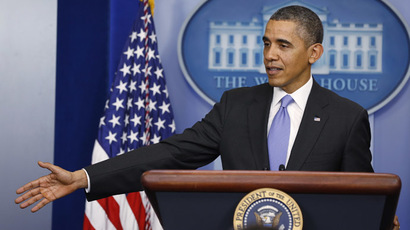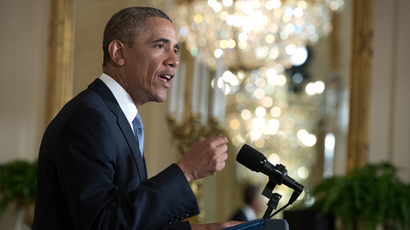Obama announces NSA programs overhaul
President Barack Obama announced as expected on Friday a major overhaul to some of the National Security Agency’s most disputed surveillance operations seven months after they was first exposed, reining in the metadata collection program among others.
Effective immediately, the president said, NSA officials must obtain court permission in order to access the government’s archive of telephone metadata — a trove of intelligence that has been regularly collected by the government through a program that its proponents say is a legally sound and crucial counterterrorism tool justified under Section 215 of the United States Patriot Act.
Evidence of that program was exposed last June through classified documents disclosed to the media by former NSA contractor Edward Snowden and spurred an immediate and ongoing international discussion that cumulated with the president’s endorsement of reform during a Friday morning speech inside the Justice Department building in downtown Washington, DC.
“I believe we need a new approach,” Mr. Obama said. “I am therefore ordering a transition that will end the Section 215 bulk metadata collection program as it currently exists, and establishes a mechanism that preserves the capabilities we need without the government holding this bulk metadata.”
Exactly who will be in charge of holding onto the phone records pertaining to millions of Americans has yet to be decided, however, and Mr. Obama says he’s tasked United States Attorney General Eric Holder, the intelligence community and Congress with finding a solution.
Among the first of top-secret documents leaked by former NSA contractor Edward Snowden since June is evidence that revealed the US government has regularly compelled the nation’s telecommunication companies for so-called metadata, in turn receiving on routine basis the primitive details about each and every phone call dialed. But while Mr. Obama and his administration has largely defended the program up to and during Friday’s speech, critics have condemned that program and others like it exposed by Mr. Snowden and have accused the government of violating the civil liberties and rights to privacy of not just Americans, but millions around the globe.
The president said during his address that he wouldn't "dwell on Mr. Snowden's actions or his motivations," citing the ongoing investigation into the leaks, but insisted that when individuals who oppose government policy take it upon themselves to publically disclose classified information as the former contractor did, then the US government "will not be able to keep our people safe or conduct foreign policy." WikiLeaks founder Julian Assange, an ally of Snowden, told CNN that the leaker will respond to the new NSA reforms next week.
Other documents disclosed by Mr. Snowden since June have revealed NSA programs that target the communications of foreign persons, including average citizens and allied leaders alike. As expected, Obama announced his intent to reform some of those operations during Friday’s address as well.
Revelations that the NSA had tapped the personal phones of foreign leaders like German Chancellor Angela Merkel caused outrage around the world last year, but on Friday’s speech Mr. Obama said that the US is the “world’s only superpower” and must continue to conduct operations allies are not able to accomplish on their own.
“We will not apologize simply because our services may be more effective,” the president said, “but heads of state and governments with whom we work closely . . . should feel confident that we are treating them as real partners.”
The US government “will continue to gather information about the intentions” of foreign governments, the president said. On the contrary, though, he also promised the NSA “will not monitor the communications of heads of state” atop the ranks of allied partners unless there are compelling national security purposes at stake. Section 702 of the Foreign Intelligence Surveillance Act (FISA) will be subjected to new reform as well, he said, allowing the government to intercept the communications of overseas targets with important information without putting as many Americans and foreign persons incidentally targeted under the looking glass.
More of the president’s new plans involve activity at home, however, including reformations meant to address concerns with how the government collects an array of intelligence gathering operations that may at times turn up the details pertaining to US persons.
Some of the issues touched upon by Mr. Obama during Friday's
address are included in a presidential policy directive published
earlier that morning:
In announcing changes to metadata program carried out through Sec. 215, Mr. Obama said, “I believe critics are right to point out that without proper safeguards, this type of program could be used to yield more information about our private lives and open the door to more intrusive bulk collection programs in the future.” His administration will begin immediately working towards transferring possession of those records away from the NSA, the president added, while at the same time significantly cutting down the number of persons whose information is collected.
“Effective immediately,” he added, “we will only pursue phone calls that are two steps removed from a number associated with a terrorist association.” Until now the US government has given itself the authority to investigate the conduct of people separated by three steps, or “hops,” from a targeted number. Last year, the American Civil Liberties Union claimed that a person with 40 contacts in their mobile phone address book could be connected to roughly 2.5 million others using the “three hops” rule.
Last month, a five-person review group handpicked by Pres. Obama after the dawn of the Snowden leaks released their findings with regards to how they believe the federal government should reform the NSA’s programs. Although the president heeded only a fraction of those, according to promises made during Friday’s address, he did also endorse significant changes to other surveillance programs that have struck a chord among civil libertarians.
National Security Letters, or NSLs, for instance, can be sent by federal agents to private businesses in order to compel them to provide specific information about certain customers without that targeted person ever being told they are under investigation. “We can and should be more transparent as to how the government uses this authority,” the president said from the DoJ headquarters, and in an effort to do as much he has directed Attorney General Holder to amend how NSLs are currently used.
Mr. Obama also announced that he’s asked Congress to establish a panel of advocate from outside of government to provide an independent voice before the Foreign Intelligence Surveillance Court, or FISC, which authorizes in secret wiretaps and similar spy operations under what critics call little-to-no oversight.














